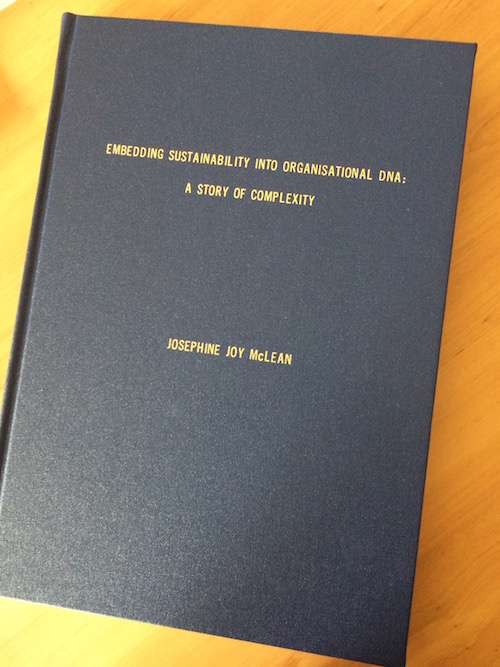Embedding Sustainability into Organisational DNA: A story of complexity

My doctoral thesis research into “Embedding Sustainability into Organisational DNA: A story of complexity” is complete! I’m so delighted that after eight years, it has been signed off and my qualification will be conferred in January 2018.
Much of our work at The Partnership is a reflection of this research. So what’s in it? Below is a copy of the abstract of the thesis. The digital version is freely available on our website here.
If all that is a bit too heavy, then consider clicking through here to listen to a podcast with Tathra Street, where we discuss some facets of the research findings.
Thesis Abstract
One indicator or measure of our global unsustainability is the ecological footprint which simply put, “measures how much nature we have and how much nature we use”. When I commenced this research in 2009, our global ecological footprint was 1.4 and world overshoot day was September 25. As I complete my research, our global ecological footprint in 2016 was 1.6 and world overshoot day was 8 August. Despite efforts to move towards sustainability – the ecological footprint is one indication that we continue to move away from being sustainable on a global scale.
Organisations of all types with their financial and human resources that enable quite sophisticated problem solving have a role to play, to lead a shift from exploiting resources to nurturing them. There is some agreement from those who represent the strong sustainability school of thought, that the shift from exploitation to nurturing is underpinned by a shift from a Newtonian paradigm to the paradigm of living systems (or complexity). But how might that shift be cultivated?
The research detailed in this thesis:
• Identifies the paradigm of complexity (living systems) as the paradigm from which we may be best able to understand the challenge of sustainability and understand how to respond to it. The paradigm shift goes beyond a cerebral appreciation of complexity and explores the multiple dimensions of a whole human being within a complex system (the organisation).
• Through the literature review exploring weak and strong sustainability, identifies the key research question – “What is the nature and dynamic of the paradigmatic shift to nurture a sustaining organisation? Sub themes of leadership and organisational culture are intertwined in the complexity of identifying a path to evolve the organisational culture.
• Develops an integrated, high-level model of emergent change to nurture a sustaining organisation and associated principles for the researcher/facilitator cultivating such a change, founded in an understanding of living systems.
• Designs an emergent systemic action research methodology to trace and make sense of the expected emergent change. Reflection upon the intended methodology and what actually occurred provides findings in regard to the methodology itself.
• Identifies research topic findings from a first person, second person and third person perspective. These findings are used to refine the high level model of emergent change to form a sustaining organisation into a stage 2 model that describes the nature of the emergent change.
• Employing an abductive approach, re-engages with the literature and iterates a stage 3 model that illustrates both the nature and dynamic of emergent change to form a sustaining organisation – a model that traces shifts in new ways of being emerging into the organisation – and details principles for practitioners to nurture each holon of the stage 3 model.
This thesis provides an account of the powerful subtleties involved in cultivating a human environment within which the paradigm shift to sustaining may be liberated. Liberated because the research findings support the notion that the ‘new’ paradigm is lying dormant within employees and needs only to be reawakened and reprioritised.
Are you inspired to learn how this work may assist you? Contact us here.



